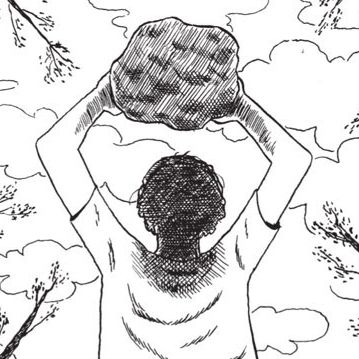
In the past few weeks, Charles Forsman has become an unlikely teen idol. The 30-something cartoonist had previously won acclaim from the microscopic subset of the population that pays attention to indie comics, but mainstream culture hadn’t caught on to him yet. Then, the apocalypse came: Netflix released a filmed TV adaptation of his serialized graphic novel The End of the Fucking World, and it became an instant sensation among younger viewers.
The tale follows a pair of disaffected adolescents, James and Alyssa, as they go on a violent road trip — one across the U.S. in the comic, but across the U.K. in the show. To get a sense of its core audience, just surf the “TEOTFW” tag on Tumblr and see the multitudinous GIF sets and breathless reviews from youths. Overnight, Forsman’s story has become a touchstone for the internet’s disaffected teens (and adults who still feel like them). Earlier this week, Vulture caught up with Forsman to talk about the show’s ambiguous ending, the prospects of a second season, and whether or not kids should graduate from TEOTFW to his brutal serial-killer yarn Slasher.
This must have been a weird few weeks for you.
It has been. [Laughs.] I’m starting to finally feel normal again after all the excitement and attention. It’s been hard to not stare at my phone because the notifications just roll in, from all the social media and all the articles being written and all. You know, everything.
What are people telling you on social media?
It’s funny. There’s a lot of teenagers watching the show, and after making this book and getting the show made, I kind of forgot that this might appeal to teenagers. Because I can’t say my comics sell to teens at all. It’s not a group of people I interact with a lot, with my art. So it was really gratifying to see all these teenagers latching on to it and making it their show and creating these meme accounts on Instagram and just this explosion.
I’ve got to imagine it’s surreal for you as an artist to see people making fan art about the show.
Yeah, it’s very weird. Someone even had a Kickstarter going for enamel pins of drawings they made of James and Alyssa. Part of me is like, “Hey, wait, that’s who I am. I’m supposed to be making that stuff!” But then I’m like, “No, this is amazing. This is really great that people are so in love with it.”
What were the origins of the comic?
I had just finished with the book Celebrated Summer, which had very laborious pages. I was doing a lot of crosshatching. They were taking a long time. After that, I was trying to figure out what I wanted to do next, and my friend Max de Radiguès, a Belgian cartoonist, started this comic called Moose, for which he was doing these little mini comics — like, eight to ten pages a chapter — and selling them for a dollar. I saw that as, “Oh, that’s a really cool template of a way to do the opposite of what I just did.” Just sort of an excuse to do quick pages and take a little bit of the stress off. I was doing that thing that people do where they say, “I gotta make great art.” Putting all these ridiculous expectations on myself, and halting myself in the process.
So it was about taking all that stuff away and making it very cheap and not worrying about if anyone was going to read it. And to not dwell on pages. It was all about moving forward and telling as clear a story as I could without looking back too much. It really started out as an experiment, really improvisational. It wasn’t until a few chapters in that I started to really figure out where it was going to go.
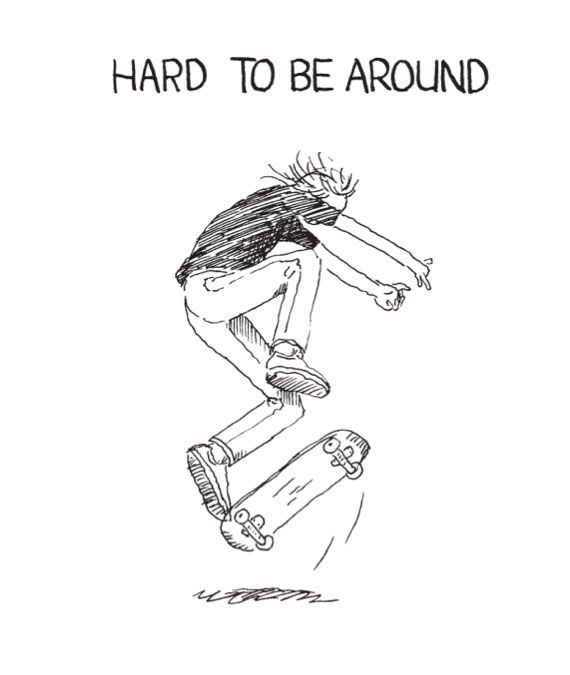
What was the first image that came into your head for it?
The first drawing that spurred the whole thing was James doing that kickflip, which is the first chapter title-head image. That’s the very first drawing I did in my sketchbook. I took that image and I was like, “Okay, who’s this kid?” I was probably watching Dexter at the time, too, so I had serial killers on the mind. [Laughs.] And of course, Badlands is one of my favorite movies, and I think that’s a pretty obvious influence on it. It crept in there.
At what point in the narrative did you start to realize what the ending was going to be?
You know, that’s funny. I don’t know if I knew what the ending was going to be until I got there. [TEOTFW show creator] Jonathan Entwistle had contacted me even before I finished it, so there was a little bit of pressure for him to know where it was going to end. He was starting to pitch it and wanted to make it into something. I remember writing up a document about where it was going and I probably just made stuff up. [Laughs.] I’m not even sure if I followed it or not. That was the spirit of the whole thing. I like to leave things open, and even when I write out the story ahead of time, it always changes. I don’t think I would finish anything if I was sticking to a plan that was very rigid. The characters oftentimes will take over and dictate things as they grow, you know? That’s the fun part for me. That’s what makes it worth doing, I think.
Are we supposed to take the ending of the comic as being deliberately ambiguous? Or are we supposed to believe that James is dead?
In my head, it’s ambiguous. Yeah, I didn’t really want to say one way or the other. I like to leave things up to the reader. That’s a big thing. I feel like, as with the show, you get a pretty good emotional point there, even though everyone screams, “No!” at the end of it. That line James says about turning 18 is still … I think that hits a moment of closure.
You say you were in contact with Entwistle before the comic was even done. How did that happen?
The mini comics were … I would send them out to my subscribers, which is probably around 200 to 300 people, and some comic shops would sell them too. And a shop in London, Gosh Comics, they carried it. I think it was through John Porcellino, who runs a little distro called Spit and a Half, I think they got them through him. I didn’t even know they had it, and all of a sudden I got an email from Jonathan [Entwistle] saying he picked up a few of the issues and he was in love with it and wanted to try and make something. I was like, “Oh, you know, I don’t know.” And so, I went and I found his website and watched some of his shorts, and I was like, “Okay, he knows what he’s doing. Maybe this could be something cool. I don’t know.” And we just started talking. He won me over and I respected him, and he got the story and understood what I was doing. And yeah, it kind of went from there.
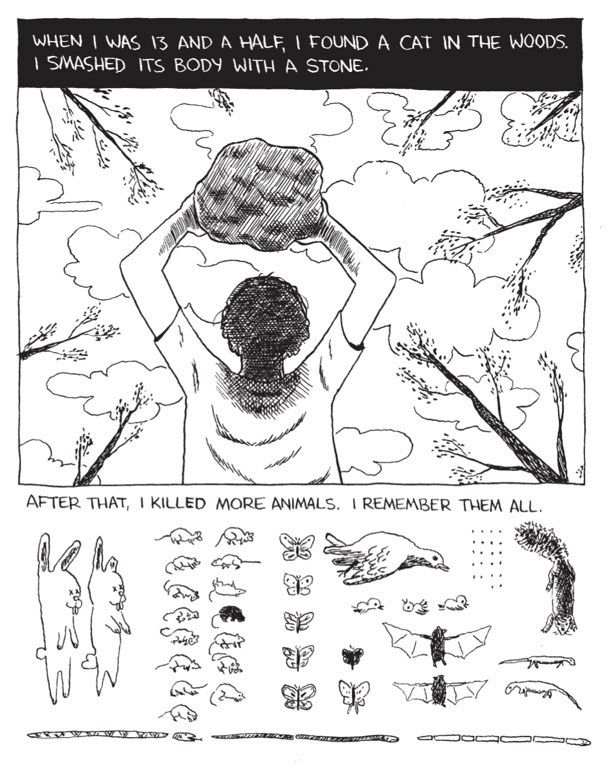
What was that first conversation like?
I think he was trying really hard to impress me about all the stuff he knew about America. [Laughs.] He said he watches baseball and stuff. Tried to name comic books he liked and I was like, “Eh, they’re okay.” But at the same time, I was probably gushing because I watch tons of British TV and I was probably doing the exact same thing to him.
Did he say he wanted to move the story to the U.K.?
No, I think originally he wanted to make it as a film in America. I think that was the very original plan. And then it was going to be a webseries, and then all these things. Somehow, luckily, we ended up hooking up with Clerkenwell [Films] and that really pushed things far along in the process. It became a series, and then eventually they got Channel 4 involved, and then finally Netflix popped on and that was huge, obviously, for us.
At what point did become real for you that this adaptation was going to happen? What was that feeling like?
Really, not until last May when they flew me to England and I was on set and I had headphones on and I heard the actors say lines that I had written alone in my room. I got bolts of electricity through my body. That was like, “Oh my God, this is really real.”
What was the first scene that you got to see?
I think the first thing we saw — oh yeah, it was the diner scene. The Americanized diner.
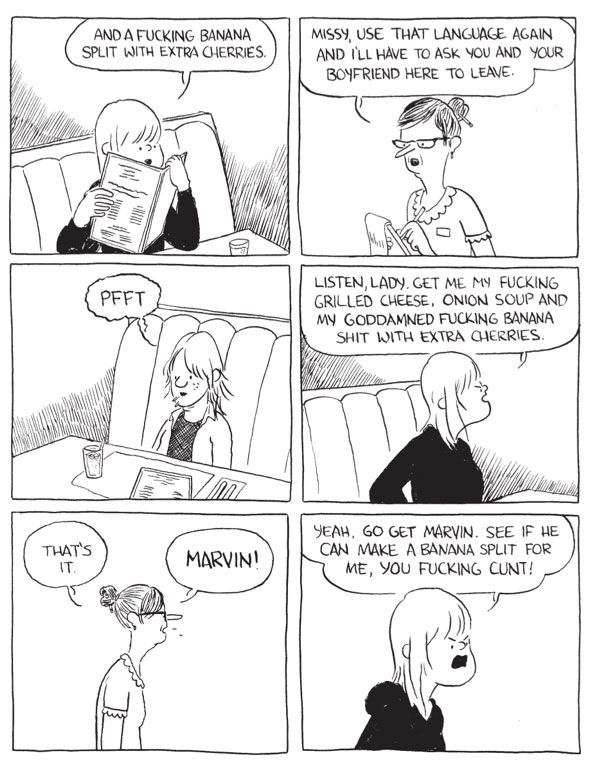
Oh, how fitting!
Yeah. That was a real treat to get to see that be filmed. That’s one of the best scenes in the whole thing. Me and my girlfriend were sitting in the back, right behind them when they were running those lines, and we were just like, “Holy shit.” It was so cool. And then Jonathan [Entwistle] and Jessica Barden [who plays Alyssa], they took us next door to a … I don’t know what they call it. A convenience store. And we bought all these British snacks and sodas. They were showing us everything. I had my first Irn-Bru, which is a soda over there that’s really good.
What kind of conversations did you have with Jessica and Alex Lawther, who plays James?
Jess is amazing. She is very outgoing, and she’s very much like Alyssa in real life. I mean, she’s complicated, of course. But she is sort of like that on set. She’s wild and she’s not afraid to talk to anybody. Alex is a lot more quiet, subdued, thinking, reading the script. But those two, you could tell they were having a real blast together. They really connected, which I think shows onscreen. My girlfriend is even better friends with Jess than I am. They text all the time about stuff. [Laughs.] As soon as I saw her performance, I was like, “Oh my God, she’s gonna be huge.” I’m so glad she’s getting the attention she’s getting right now, because it’s well-deserved. I’ve never wanted anyone to be a star before. [Laughs.] But I was like, “She needs to be huge.” Because she really has something amazing.
How involved were you in the creation of the show? I assume it was mostly hands-off, but did you do any consultation or anything like that?
Yeah, just unofficially. I didn’t really want to be hands-on. It’s tough, especially if it’s the first thing you’re getting adapted. You don’t really have a lot of say. Also, I was keeping myself at a distance because I wanted to draw my comics and I didn’t want to get sucked into this whole other thing where all of a sudden I was taking all my time to try and make this TV thing happen. I was kind of glad to not be involved, and I really trusted Jonathan, so it wasn’t really an issue. But throughout the whole thing, Jonathan would call me and we’d always talk and he’d tell me what was going on. I think he really valued my opinion and kept me in the loop and we discussed everything as it was happening, so I never felt like it was taken away from me. But at the same time, I was really happy, too, because I appreciate adaptations when they’re allowed to do their own thing. I hate when they make something where you can tell they’re trying really hard to make it look exactly like a book or a comic, you know?
Yeah.
I like when they’re allowed to create their own little thing, and just take the essence or the spirit of the book. Which, I think they did a pretty good job. I was surprised at how closely it followed my story. I didn’t expect it to follow it so closely.
That’s interesting you say that, because I thought that there were a lot of points of divergence. What was the most surprising change?
They clarified James and Alyssa’s relationships and their backgrounds a little more than I did. I only had hints of their backgrounds. They really created a thrust for their characters to even want to leave home that I really thought was awesome. And, of course, I always tell the writer, whose name is Charlie Covell, that I’m jealous of everything she added to the story. And Eunice and Teri, the detectives, they’re just incredible. That’s all Charlie. She didn’t get any of that from my book and that stuff is so good. I wish I’d thought of it.
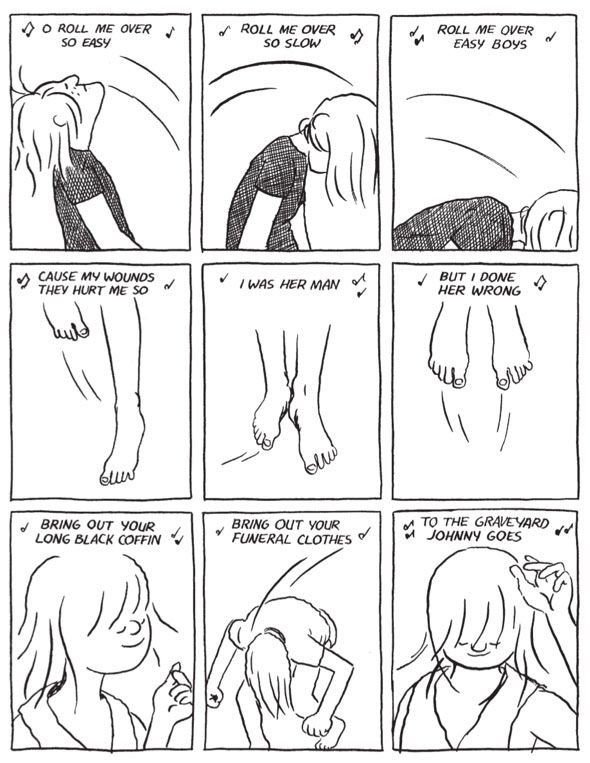
Do you think it changes the story now that it’s set in the U.K.?
I don’t know. I don’t think so. Even though it’s British, it still felt like a British version of an American story. I think the reaction was that it was not the usual type of show that they get over there, and that there’s something American that’s still inside of it. Like the idea of a road trip. That’s not a thing, maybe, in England as much as it is here. Probably just because of the size of the countries.
Have you heard anything about a second season?
Not yet. I don’t know. The people at the top are still talking. I haven’t heard much lately, but I’m sure they’re all seeing the begging of people online for it. So we’ll see. We’ll see what happens.
Much of your work deals with the plight of adolescents. Why do you think you keep coming back to that?
I think it’s just me interfacing my own experience and trying to make sense of that time in my life. I was pretty depressed when I was a teenager. The thing that spurred that on was that my dad died from cancer when I was 11 years old. I always felt like I grew up a lot faster than my peers. I got sick of high school really quick, and I dropped out in 10th or 11th grade. I was in such a rush to grow up that I think I missed a lot of it. And it’s just such a frustrating time in everyone’s lives. You’re so passionate about all your feelings and you feel like you have the world figured out, but at the same time you’re completely clueless and frustrated and trying to figure out who you are. It’s just something I keep coming back to even when I try not to. It seems to pull me back in. It’s an interesting time in everyone’s lives, and everyone seems to relate to it no matter who they are.
Have book sales spiked since the show came out?
Yeah, especially when it did Netflix a few weeks ago. Fantagraphics, the publisher, sold out of the print run, I think over the weekend, after it debuted.
Oh, wow.
All the distributors were out. And they were like, “Oh my God.” I got a call from my editor on Sunday or Monday and he was like, “This is a real bona fide hit.” We’re going to run back to press, expedite it, so there’s more books being made as we speak. Which is great. That was the one thing I had my fingers crossed for, that it would translate into people checking out the book, so that’s been really gratifying. It seems like a lot of people are like, “Oh my God, it’s based on comic. I’m going to read it.” I see that online a lot.
Let’s hope the teens don’t necessarily read Slasher next.
Yeah, yeah. I know. But they can handle it.
What kind of response did you get for Slasher?
It was good. It was better than I expected. That was the first book that I serialized through comic shops like through Diamond Distributors, the big distributor in comics. It was the first time I did full-color pamphlets on the shelf on Wednesdays. Usually, I serialize on my own and do it mail order, but that was sort of an experiment. It can be tough to get those shoppers to buy anything else, besides Marvel and DC and Image and stuff like that. And it didn’t do gangbusters. Me and the publisher, we were surprised at the sales — we sold a lot more than we even expected — and I got lots of letters from that book. People really were into it. It was gratifying. I was trying to do a Brian De Palma. I always say that’s my Brian De Palma movie.
How’s the publisher you started, Oily Comics, doing?
I did it hard-core for about two years and I really … I didn’t officially end it, but I pretty much have. It came to a point where I was publishing five mini comics a month, and doing everything myself: printing, stapling, folding, shipping. I just got burnt out on it. I love doing it, I love publishing and production and design and all that. But I just found myself being taken away from my own comics work, so I made the decision to pull back on it. I’m focusing on my own stuff now. I publish other people every once in a while, but very rarely now.
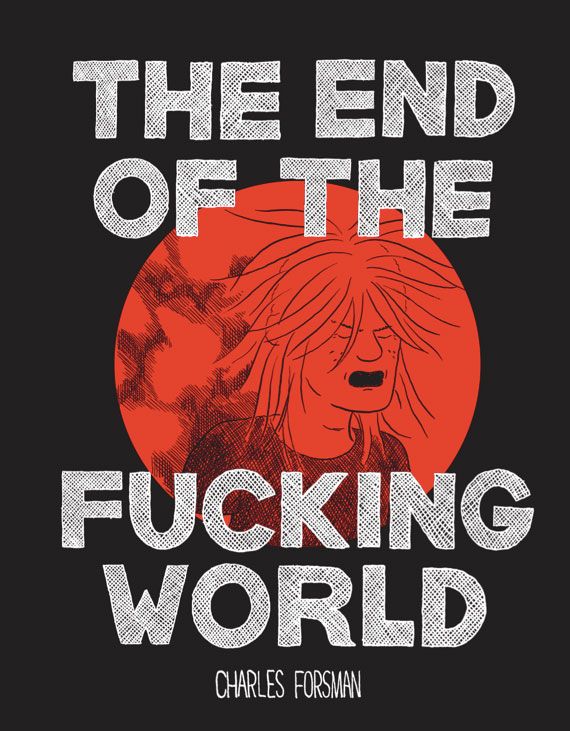
What’s a typical workday like for you these days?
Well, lately it’s been rough because I’m very distracted. But usually, I wake up, eat my breakfast, and then try and get in my studio and work. I’m just getting started on my new book right now. There’s always a weird period when you start a new thing where you’re unsure about how to do everything, so there’s a lot of second-guessing and figuring out how things are going and doing a lot of writing. I’m in that stage, but I’m slowly getting there. I’m feeling better about it now.
Any chance you can divulge some information about the new project?
I’m not going to say exactly what it’s about. But it’s called Automa. Spelled A-U-T-O-M-A. It’s just “automatic” with the end of the word cut off.
Ooh.
And it is … I don’t know. I don’t want to spoil it, but it’s sort of a … Oh God, I don’t know. I’m not going to say anything. No, I’m not going to do it.
One of the things I like about your work is you play around with your own art style a lot. You try different things. Is Automa going to be in yet another visual approach?
Yeah. That’s what I’m working on now, figuring out visually what it’s going to look like. I think it might be an evolution of what I was doing in Slasher, but right now I’m thinking I want to have it read like a manga. So I’m going to try and cut down on the number of panels and have it be a faster read. And it’s going to be black and white. Yeah, we’ll see how it turns out. It never turns out as I plan it.
I imagine that your teen fans will start asking you how they can break into making their own comics. What advice would you give them?
The main thing is to give yourself permission to do it. You don’t need an editor or a teacher or a publisher to tell you to do it. I think a lot of people get caught up in, “Oh, I have to pitch something to an editor or a publisher.” You gotta just start making stories. When I’m not worrying about what other people want, that’s when I do the best work. I always get the best reaction. That’s what The End of the Fucking World was for me. That was the book I felt like I did for myself, wholly and totally. And right when I started releasing mini comics, I could tell from the reaction that people were loving it. That was a new feeling for me. I think that’s important.
This interview has been edited and condensed.

